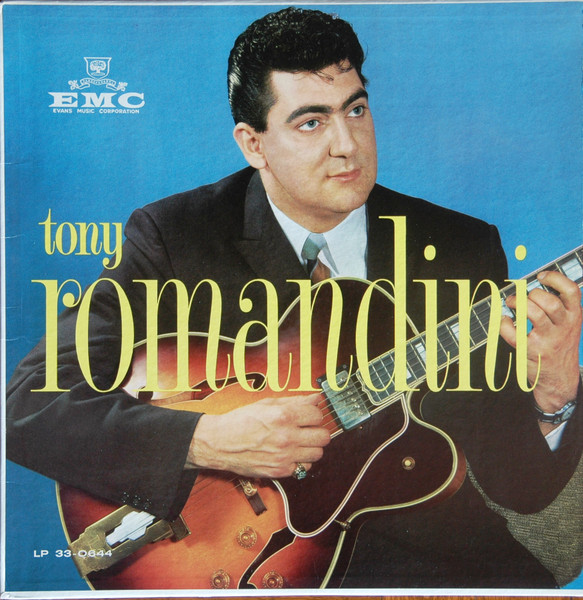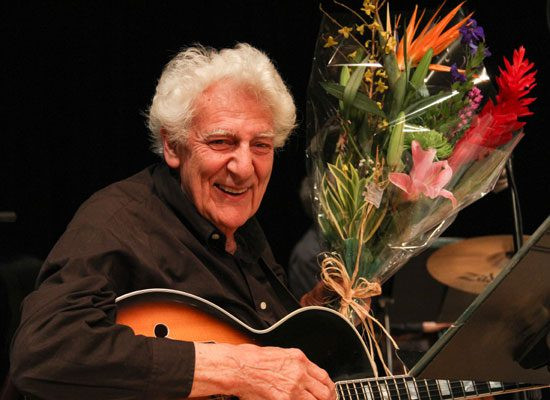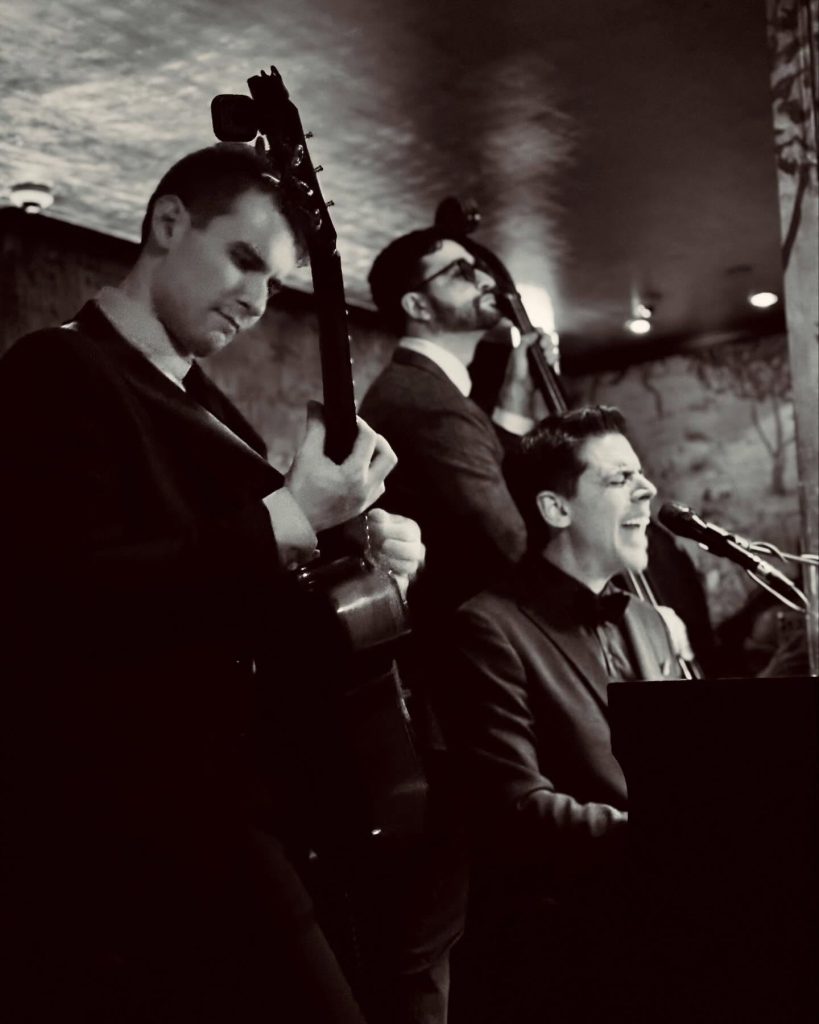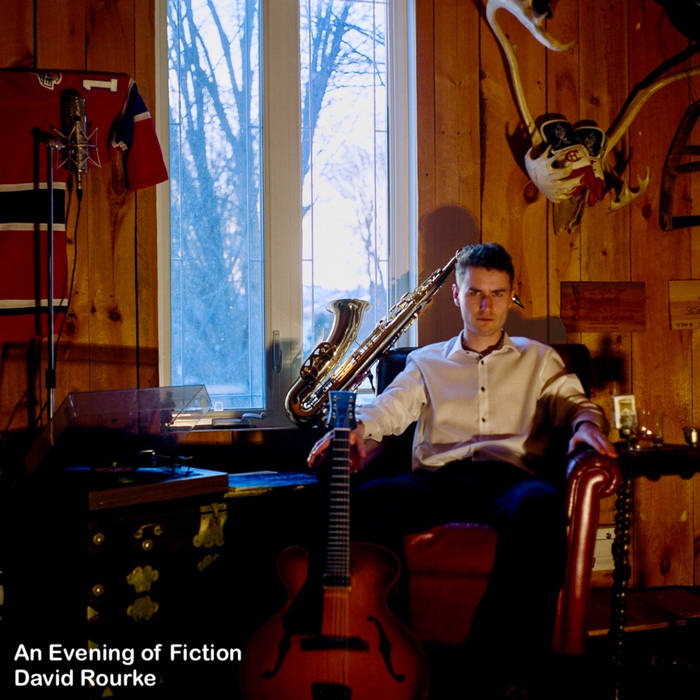
Large ensembles are great. I love the challenge of finding your role in a band, and not straying too far from it. It becomes about the music as a whole as opposed to your individual ideas. – David Rourke
A few years ago or more a cousin of mine took a job as a driving instructor. One day he calls me up and says that he has “this new driving student” who plays great Jazz Guitar and that I should be on the look out for him. That was my first introduction to the wonderful David Rourke and it’s been great watching him on the sidelines develop as an extremely confident player and composer ever since.
In this interview, David talks about his early years working on his craft in Montreal; his influences; his gear; his albums; his wininng first place in the prestigious International Jarek Smietana Jazz Guitar Competition; his work ethic and much more. David Rourke is definitely a talent deserving wider recognition and I look forward to hearing lots more from him in the years and decades to come.
So grab a beverage of choice and enjoy this featured Jazz Guitar Life interview with David Rourke…
But first…
…………
As a one-man operation, if you would like to support all the work I do on Jazz Guitar Life, please consider buying me a coffee or two. Your support helps me to focus on Jazz Guitar Life so that I can continue to bring you great interviews, reviews, podcasts and other related Jazz Guitar content. Thank you and your patronage is greatly appreciated regardless if you buy me a coffee or not 🙂 Or if you prefer PayPal – Lyle Robinson
…………
JGL: Thank you David for taking the time to talk to Jazz Guitar Life. First off, if we can get into a little background about you that would be great. How old are you?
DR: I’m 26 years old.
JGL: Now, for those who are unaware of you, could you give Jazz Guitar Life readers an elevator pitch of who David Rourke is?
DR: I’m a jazz guitarist, mixing engineer and Juilliard graduate who also writes and releases pop-rock music in the style of Steely Dan.
JGL: Whereabouts are you located?
DR: I’ve been in New York City since 2020. I’m from Montreal.
JGL: Nice! Let’s go back a bit. Were you interested in jazz from the beginning or were there other musical interests before jazz? How did you find your way to this particular music and instrument?
DR: I started playing guitar at age 10 when rock was my thing (Led Zeppelin, Van Halen). Then it was the more complex progressive rock from 12-15 (Rush, Genesis, Yes). Based on the little I knew about jazz, it felt like the logical genre of music to dive into as a young and eager musician and listener.
JGL: “Logical” indeed! When starting out on this path, can you recall a particular moment that first excited you about jazz guitar or jazz in general? The one that made you say “that’s what I want to do”!
DR: I had an “awakening” at Domaine Forget’s jazz workshop in 2014. Listening to the faculty (Joe Lovano, Dave Laing, Fred Alarie etc.) as well as the older and more advanced students was an absolutely transformative experience.
JGL: Wow. Great lineup! Similarly, who were your influences on jazz guitar when you were beginning, and have they stayed the same or have they changed over the years? Who are you listening to today (guitarists or non-guitarists)?
DR: My early jazz guitar influences were Wes Montgomery, Barney Kessel and Grant Green. There was a period where I was avoiding listening to guitarists, in favour of horn players and pianists. This seems to be a common phase that jazz guitarists go through. Luckily, I returned to these pillars of the guitar, adding some more in the process namely Jim Hall, Kenny Burrell, René Thomas. Two of my absolute favourites, and active today, are Peter Bernstein and Pasquale Grasso.
JGL: In the same vein, who has been most influential in your life as a Jazz Guitarist and why?
DR: It would be between Jim Hall and my friend and mentor, the late Tony Romandini. Jim Hall is as close to a perfect jazz guitarist as you can find. And Tony’s mastery and versatility on the guitar, as well as his confidence and joie de vivre had a great impact on me.


JGL: You can’t go wrong with those two in your corner! Shifting the topic a little. What was your first guitar and what are you playing now?
DR: My first guitar was a Stratocaster copy. I taped it up and spray-painted it to look like Eddie Van Halen’s “Frankenstrat”. Currently I mostly play on my custom archtop built by Steve Paquet in Longueuil. It’s a wonderful instrument.
JGL: Is that it!!?? LOL 🙂
DR: I have too many to count! A recent and really special one is a 12-string electric that Mike Millard built for me. The Paquet archtop is my #1. I leave a nice old Gibson L-50 (with a P90) in Montreal. I have a great Telecaster that Mike built as well, a Mexican Stratocaster, a beautiful Tokai Les Paul and a handful of acoustics. Dozens of pedals, many of which I’ve built and some cool vintage ones. I only use pedals when recording or at shows where I’m playing my original music. I own a couple Henriksen amps and use a Henriksen Blu amp on most of my gigs. I also have a Fender Deluxe Reverb, a 5e3 Tweed Deluxe clone that I built, and a Gibson GA-50 from the 50’s.
JGL: Some great gear you got there David!! And shifting gears a little – no pun intended 🙂 – Is there anyone – alive or dead – who you’d love to play and/or record with and why?
DR: Sonny Rollins. He’s my favourite artist of all time. I love the sense of humour in his music. I know how enigmatic he can be so who knows how it would go!
JGL: Nice! You would need to give Bobby Broom a call to see how it truly is to play with Sonny. Now…did you know early on that music was something you wanted to do as a career choice and if so, what have you done to make this choice work for you?
DR: Since I could remember, yeah. I started practicing a lot in high school. At music schools (Vanier, McGill and Juilliard) I’ve built a strong network of musician friends and colleagues. Frequenting the weekly jam sessions in Montreal and then New York helped me hone my craft and meet more people on the scene. From my YouTube channel, I’ve built up a little transcription business. About five years ago I really got into mixing. In the last couple years, I’ve been able to turn it into another source of income.
JGL: Nice! Speaking of networking, in 2019 you won first place at the prestigious International Jarek Smietana Jazz Guitar Competition in Kraków, Poland, and judged by renowned guitarists Mike Stern and Peter Bernstein no less. First off, congratulations on a “job” well done and secondly, what were the steps taken to get to that point? Were you working off a programme of your own choosing or were you directed by the competition to perform certain pieces? What did you play and what was the preparation process like?
DR: Thank you! I heard about the competition from my friend Félix Lemerle. I sent in a tape and passed the first round of auditions. Once in Poland, they held the semifinals and then the finals. We could play any piece we like, and one composition by the competition’s namesake. I ended up playing Wes Montgomery’s “West Coast Blues”, “If Ever I Would Leave You”, from the musical Camelot and Jarek Smietana’s song “Flashing Dance”.
JGL: Nice! In the same vein, did this award, apart from looking great on your musical resume, offer you greater opportunities that you may not have been privy to prior to your winning?
DR: It probably helped me get accepted into Juilliard. It was a wonderful experience where I met some great guitarists and bonded with a musical hero of mine, Peter Bernstein.
JGL: Speaking of Juilliard…you have definitely followed a more formal academic route to get where you are today…from your early years studying under the expert tutelage of Montreal Guitar legend Tony Romandini, to getting a Bachelor’s degree in Jazz Performance from McGill University to a Masters degree from the renowned Juilliard School of Music…and you’re just how old?! LOL. Was all this study a strategic design on your part or did you fall into it more naturally?
DR: It seemed to all happen kind of naturally. One thing I’m glad I did was to get through each degree quickly. I did Vanier’s 2-year program instead of their 3, 3 years at McGill instead of 4 because of Vanier credits transferring and from passing exemption exams, and a 2 year Masters degree at Juilliard, with no breaks in between any school. I think it’s great to take breaks or take more time, but in my case, I’m glad I was out of school sooner rather than later.
JGL: I can imagine. Kudos to your strong work ethic and you seem to have balanced the academic with the practical as it were by playing in a variety of performance settings such as Montreal Jazz Clubs Dièse Onze and Upstairs alongside various venues in New York City. How did these opportunities come about and do you have a favorite venue to perform in?
DR: While at Vanier, I started pestering both club owners for a gig. It took a while but I finally got my first show at Upstairs in 2017. It was such a thrill, and I’ve since developed a good relationship with both clubs and play there every once in a while. I started visiting New York frequently while at McGill. On one trip, I met trumpeter Don Hahn who offered me the guitar chair in his band. At the time he was playing at Fat Cat (now Cellar Dog) once a month. I would do the gig almost every month, while still a full time student in Montreal. Playing at Fat Cat with Don, I met so many great musicians both in the band and showing up to sit in. Because of my frequent NY visits, when I finally moved to New York to start at Juilliard it was a smooth transition.
JGL: Speaking of gigs, it appears that you have been featured in almost every musical setting imaginable, from solo guitar to large ensembles like in Ron Di Lauro’s Big Band, the Edmonton Symphony, and the Minnesota Symphony.How did these great gigs come about and what was needed of you musically?
DR: Large ensembles are great. I love the challenge of finding your role in a band, and not straying too far from it. It becomes about the music as a whole as opposed to your individual ideas. Ron Di Lauro was my big band director at McGill and has gotten me on a lot of great gigs including the “C’est si bon de danser” shows we did from 2019-2023 all over Québec. These more recent symphony shows have been as part of Tony DeSare’s group. Tony is a great singer, pianist, arranger/orchestrator and performer. I’ve learnt so much already being a part of his band. I met him by mistake, when a scheduling mix-up made me his guitarist for a night at Bemelmans Bar in New York.

JGL: Now THAT is the definition of kismet and while I can imagine that these high-profile gigs are all creatively satisfying, I’m curious to know – at the end of the day – are there one or two musical situations that you prefer over all others?
DR: My favourite gigs are the ones with friends where we can call tunes we like. I’m very lucky however to get musical satisfaction from almost any setting. People say Billy Higgins was always happy to play, regardless of the band or music. I try to be more like Billy!
JGL: Great advice and should be a T-Shirt slogan…lol! Let’s get a little current shall we? Amongst your other musical and personal accomplishments, you released your first album back in 2022 titled An Evening of Fiction. Now in all honesty when I heard your first album it took me a little by surprise – although I dug it! – as I was expecting a more “traditional” Jazz Guitar style album. You seem to have an eclectic set of musical styling’s that bridges pop and rock alongside a more advanced harmonic understanding. Kind of like Billy Joel meets Steely Dan meets Chicago meets Styx! What was your intent when writing and recording An Evening of Fiction and did you “lose” any of your staunch Jazz Guitar loving fans? Was I the only one surprised? LOL ☺

DR: When all my gigs disappeared during Covid, I had no more creative outlet. I decided to start writing and recording. I’d have to do everything myself because of all the restrictions. I didn’t want to record jazz because to me it’s meant to be played live with others…
JGL: That’s a very interesting way of looking at it!
DR: …yeah…and besides, I had already made a rock album by myself at age 15 so it seemed natural to write music more in that vein. It was more likely I might be able to execute all the parts satisfactorily. When I finished writing, recording and mixing the first song, I got scared at how much fun and fulfilling the process was. I asked myself: “what does this mean for my career as a jazz guitarist?”. I realized that I can do both. And if anyone took issue with that, who cares?
JGL: Exactly!! Good for you! Now…rumour has it that you were coming out with a new CD in April titled Apple Hill. Will it follow in the same vein as your first or will there be something different that we can all expect?
DR: Yes, it’s a logical follow up to An Evening of Fiction. However, there were many more collaborations on this one. My friends Tyler Henderson, Daniel Berkey, Abdias Armenteros and David Sneider appear on the album. The drums are performed by Peter Glynn or Daniel Verdecchia, two monster drummers.
JGL: Sounds great and I look forward to being surprised again 🙂 You have obviously found your stride in this business and have done quite well so far given your age. Any “tips or tricks” you can lay on those interested in doing the same? Should we all move to New York…lol? 🙂
DR: New York is a magical place but not absolutely necessary to move to. It depends what you want! Generally speaking, I would say put yourself out there and meet as many people as possible, wherever you are.
JGL: Good advice! Now, since this is Jazz Guitar LIFE, were your parent(s) and family members supportive of your musical career choice and how difficult do you find it making a living as a jazz guitar player specifically or as a working Guitarist in general?
DR: My parents are the best! I’m so lucky, they are very supportive. I was pretty burnt out after Juilliard. Without the busy school schedule my calendar became pretty empty, and unfortunately I wasted a lot of time. It took about a year before I got over the burnout and things were starting to pick up. Only in the last year or two have I been really busy with a consistent flow of gigs.
JGL: l am glad you found your groove again and speaking of burnout and other mental health issues, it seems that almost every musician, no matter their level and professional stature have their own insecurities to deal with when it comes to the music and playing their instrument. What, if any, insecurities do you/did you face on your instrument and how do you/ did you work at getting over them?
DR: It can be a battle playing the guitar and it’s been a particularly tricky last few years for me dealing with some tendonitis. It’s not so bad, but bouts of pain and inflammation will creep up from time to time. It can be mentally taxing, as the thing you love to do the most is also causing you physical pain.
JGL: So sorry to hear that David and I hope you’re able to remedy this issue to your satisfaction. Tell me…how do you handle the other side of being a working musician – the business side? Do you find the business side of being a Jazz musician something that should be taught in music schools or should the playing be left to the player and the business side of things be left to managers and agents?
DR: I think there should be a much stronger emphasis on music business at music school. The business side is not most musicians’ forte, yet it’s so important for your success. It’d be great if everyone could get a good manager and agent, but you need to already be successful to attract either.
JGL: Unfortunately, it does seem to be a Catch 22 situation from time to time. I’m curious, if you had to do one thing over again, what would it be and why?
DR: It’s never too late, but I would’ve taken singing lessons earlier.
JGL: Cool! I know you’re still relatively young, but have you had second thoughts about your choice to have music as a career and if so, what other career path do you think you would have followed had you not been a guitar player.
DR: I haven’t had second thoughts about pursuing music. I’m not sure what else I would want to do.
JGL: LOL…I hear ya! So…when you’re not on the band-stand or in the recording studio, what do you like to do to unwind?
DR: I love biking, particularly in the west-island or in Central Park.
JGL: Nice, and if you don’t mind sharing, what would one thing be that would be of a surprise to many of us that we don’t already know about you?
DR: I love Indian food and watching Norm MacDonald clips.
JGL: OMG!!! I love Norm…he was sooooo funny 🙂 Thanks for that! Well David…as we wrap this interview up, tell me, what does the future hold for David Rourke?
DR: Hopefully more great gigs, and even more original music and shows; eventually a tour!
JGL: Awesome! I look forward to all of the above! 🙂 Thank you David Rourke for taking the time to chat with Jazz Guitar Life. I wish you much success in all your endeavors!
DR: Thank you very much! I really appreciate it.
…
Please consider spreading the word about David and Jazz Guitar Life by sharing this interview amongst your social media pals and please feel free to leave a comment. We’d love to hear from you 🙂
If you would like to support all the work I do on Jazz Guitar Life, please consider buying me a coffee or visiting the Jazz Guitar Life sponsors. Thank you and your patronage is greatly appreciated regardless if you buy me a coffee or not…Or if you prefer PayPal 🙂

Leave a Reply